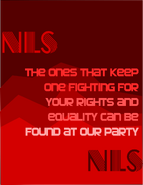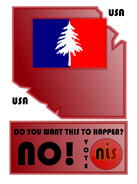| New Lovian Socialists | |
 | |
|---|---|
| Abbreviation | NLS, The Socialists |
| Chairman | Ferenc Szóhad |
| Founded | February 8 2010 |
| Ideology | |
| Ideology | socialism, progressivism |
| International | socialism |
| Spectrum | progressive-far-left |
| Lovian Politics | |
| Predecessor | none |
| Close to | LLCP, CPL.nm |
| Far from | CCPL, IGP |
| MOTC | █████████ (6,25%) |

| |
| Notable members | |
Dennis Hordeum Damian Carter Abdullah Al Felem David York August Magnus Donia | |
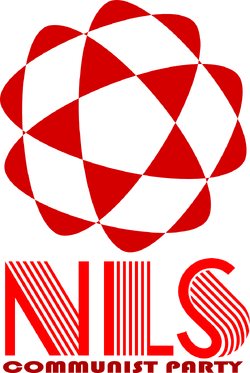
Logo of the New Lovian Socialists
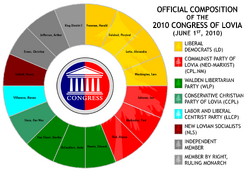
Current composition of the 2010 Congress, including one NLS member, one-sixteenth of the Congressial seats
The New Lovian Socialists, abbreviated NLS and dubbed The Socialists[1], was a Lovian moderate republican leftist party. The NLS focused on populist socialism. It was founded in February 2010. The party participated for the first time in the 2010 Mid-Term Elections. In September 2010 the party dissolved itself in the CPL.nm.
The New Lovian Socialits stated New Lovian Socialism is their ideology, a more radical stream of American socialism, primarily focusing on turning the state into a republic, and turning the economy in a partly state operated one.[2] Spear points were the introduction of Esperanto as lingua franca, nationalizing the vital parts of the economy, and confining the power of the king, not the dismantling of the monarchy, as many people think.
The party first and at the same time last chairman was Ferenc Szóhad, who constituted the so-called Big Four together with Abdullah Al Felem, David York and Damian Carter.[3] The party had one MOTC in Congress, Ferenc Szóhad.
Symbols and party color
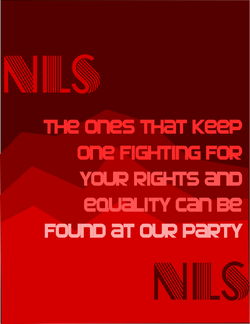
The party color of the NLS is red-brown, sometimes tending to red. The party color symbolizes the ideology of the party, socialism, without being too Stalinist. The logo contains red-brown as well as yellow, which is considered as being a NLS color as well.
The logo is a circle with the abbreviation "NLS", standing for New Lovian Socialists, written in bold Bauhaus 93 typeface. The word is surrounded by a yellow line, giving a more three-dimensional effect to the logo. The word itself is brown, tending to red more to the right, with a red shine on the S. The circle itself is also red, with a cup shaped gradient on the bottom, causing a three-dimensional shine, button like shape.
Propaganda
The NLS used many posters, banners and buttons in election time, sometimes with their official logo on it, sometimes not, or with alternative logos. They are famous for their experimental and provocative posters. Most of the time David York designs the posters, introducing new ways of party poster design and experiments with typefaces.
Posters
Every election, the NLS used as many different posters as possible, to show their variety.
Mid-term Elections 2010 posters and banners
In the elections of 2010 the NLS used the following posters:
State Elections, Fall 2010 posters and banners
In the state elections of 2010 the NLS used the following posters:
History
Establishment
NLS was founded on the 8th of February, 2010, by Ferenc Szóhad, a former Anarchist communist. Szólad changed his political view radically by his sudden aversion of the CPL-NM and also anarchist communism. He founded NLS as a way to fill the gap between what he calls "ultra leftist parties and center parties" in Lovia. It has been noted though, that the New Lovian Socialists are more leftist than the other socialist parties in the nation.
2010 Mid-term Elections
The NLS participated for the first time in an election in the Mid-term Elections of 2010. The party participated with one member, party leader Ferenc Szóhad. Originally, the party was going to participate with two members, but Damian Carter withdrew at the last moment due to private reasons.
The elections didn't went very well for Szóhad. He was 6th out of 7 candidates on 24 May 2010, what meant he would not be elected as Member of the Congress, due to Medvedev's Red Line. This guideline said that only the first 5 candidates were to be elected.
On the 25th of May 2010, Pierlot McCrooke, 7th in line, withdrew, knowing he would have no chance of becoming MOTC with only the half of the votes of the 6th in line, Ferenc Szóhad. He wanted to make a statement as well. He is pro Kenson, the system in which every citizen can have a vote in the Congress by referenda.
His withdrawal made the way free for cancelling the Red Line, because, as Medvedev put it, "it's a bit nasty" to let in all candidates in the Congress, except from one person (Ferenc Szóhad). This meant that Szóhad and his NLS were elected without having more votes than one of the other 5 candidates.
When entering the headquarters of the party, after being elected, Ferenc Szóhad gave a speech, lacking company of secretary Damian Carter, who was in China at that moment to study communism.
- "We have been elected, comrades, I say this in plural, because I want to make clear that I'll function as a spokesman for you all. This is a bright day for the socialism in Lovia!" He added: "But, but I want to make sure that you all know we are in the congress thanks to PM Medvedev." He went on, saying: "It's a clear sign that we aren't ready yet, that we are still not solely dependent on our voters, but on the goodwill of others in the congress. It shows us, that we still need to work. Not on our 'allure' or other 'hollow' things, but we need to reach our goals, do our duty, serve the country, and improve the life of the average Lovian!"
It's clear that NLS hereby already presented its program for the MOTC year of Szóhad between 2010 and 2011.
2010 Congress
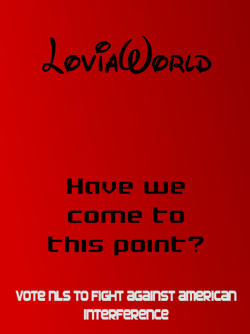
The NLS took a step back in the first weeks after elections, but recovered in early July and proposed quite a few bills concerning abortion - one of the things the NLS wants to legalize - alcohol, narcotics, border control, copyright and so on. Szóhad rewrote together with Damian Carter and David York the alcohol law, adding some rules and broadening the law towards matters concerning narcotics.
TRM wrote the following about the proposals of Szóhad, Carter and York:
- July 1, NOBLE CITY - Today, the NLS proposed a new bill in the First Chamber, full of long forgotten issues about alcohol and narcotics, and reopening the debate about the capitalist laborers medicine. Szóhad opened with stricter rules about alcohol by rewriting an already existing bill, and eventually added laws for narcotics as well. The First Chamber is discussing the matter right now, and probably in a few days time the bill will pass on to the Second Chamber.
- The bill fills gaps in the Federal Law, now full of holes - with special credits to the capitalists. Stricter rules for alcohol use are proposed, as well as new rules for the use of narcotics, a subject not discussed before, and a subject lacking proper rules. The law is going to be a success, according to us, as PM Medevedev pointed out in the First Chamber: "I can find myself in this law".
- In addition to the new proposals concerning drugs and alcohol, Ferenc Szóhad designed together with David York two other bills, concerning customs and copyright. "We don't want to get nearer to the American way of lawmaking, but we certainly need more and better rules concerning copyright matters", thus pointed out David York in a talk with TRM. "All three bills will pass on to the Second Chamber in a few days", thus said Szóhad, "but first we need to look at it in more detail and add some more rules concerning medical use, since several MPs already complained about the lack of rules about that certain topic in the bill". He continued, responding on fears of the copyleft organization that Lovia will loose its "free for all" policy: "we are not a banana republic, and certainly not a place for obscure organizations with impossible demands."
After the bills concerning abortion and so on were moved to the Second Chamber on the 4th of July, the NLS proposed on the 5th of July together with the CPL.nm an additional bill concerning the nationalizing of the Ecompany, Walkernet, Newhaven Express, Newhaven Connect and the Pacific Railroad Company, in order to stabilize the economy and to pull Lovia towards a more communist economy. The NLS proposed a sixth amendment in the Constitution as well, but the CPL.nm disagreed and the NLS is reconsidering the amendment.
In the meantime the abortion and revised alcohol bill was - together with the other bills - voted for in the Second Chamber. The CCPL, lead by Oos Wes Ilava, strongly disagreed with the bills, and voted against both bills on the 4th of July.
Ideology
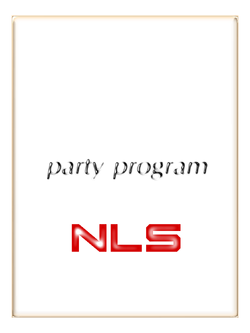
Party Program of the NLS.
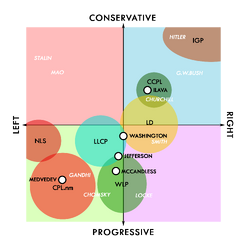
The NLS in the Lovian political spectrum. The NLS is closely related to the CPL.nm, and to its minor break-away party the LLCP.
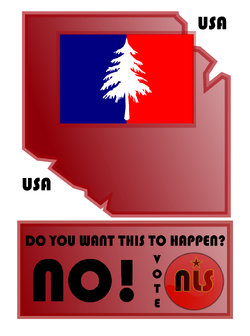
Party poster of the New Lovian Socialists, designed by David York.

Ideology of the NLS
The ideology of the NLS is New Lovian Socialism, based on regular socialism (if you can coin moderate socialism in way).
Introduction on socialism
Socialism is an economic and political theory based on public ownership or common ownership and cooperative management of the means of production and allocation of resources.
In a socialist economic system, production is carried out by a public association of producers to directly produce use-values (instead of exchange-values), through coordinated planning of investment decisions, distribution of surplus, and the use of the means of production. Socialism is a set of social and economic arrangements based on a post-monetary system of calculation, such as labour time or energy units.
Socialists advocate a method of compensation based on individual merit or the amount of labour one contributes to society. They generally share the view that capitalism unfairly concentrates power and wealth among a small segment of society that controls capital and derives its wealth through a system of exploitation. They argue that this creates an unequal society that fails to provide equal opportunities for everyone to maximise their potential, and does not utilise technology and resources to their maximum potential in the interests of the public. Socialists characterise full socialism as a society no longer based on coercive wage-labour. Reformists and revolutionary socialists disagree on how a socialist economy should be established.
Modern socialism originated in the late 18th-century intellectual and working class political movement that criticised the effects of industrialisation and private ownership on society. Utopian socialists such as Robert Owen (1771–1858), tried to found self-sustaining communes by secession from a capitalist society. Henri de Saint Simon (1760–1825), who coined the term socialisme, advocated technocracy and industrial planning. Saint-Simon, Friedrich Engels and Karl Marx advocated the creation of a society that allows for the widespread application of modern technology to rationalise economic activity by eliminating the anarchy of capitalist production. They argued that this would allow for economic output (or surplus value) and power to be distributed based on the amount of work expended in production.
Some socialists advocate complete nationalisation of the means of production, distribution, and exchange, while others advocate state control of capital within the framework of a market economy. Socialists inspired by the Soviet model of economic development have advocated the creation of centrally planned economies directed by a state that owns all the means of production. Others, including Yugoslavian, Hungarian, East German and Chinese communist governments in the 1970s and 1980s, instituted various forms of market socialism, combining co-operative and state ownership models with the free market exchange and free price system (but not free prices for the means of production).
Libertarian socialists (including social anarchists and libertarian Marxists) reject state control and ownership of the economy altogether, and advocate direct collective ownership of the means of production via co-operative workers' councils and workplace democracy.
Contemporary social democrats propose selective nationalisation of key national industries in mixed economies, while maintaining private ownership of capital and private business enterprise.
New Lovian Socialism
New Lovian Socialism is quite the same as regular socialism, but is more radical than usual. On the contrary, the ideology is not anarchistic, and tries to get proposals through in a peaceful way. New Lovian Socialism wants Esperanto to be the world language, holdings to be split in separate companies, and one currency for all countries. Vital economical branches need to be state operated (like oil and gas production, schooling, energy supply, television networks) and foreigners are welcome.
Party program
 See also: NLS party program for the party program.
See also: NLS party program for the party program.
The party program of the NLS focuses on some major aspects of the Lovian politics, as well as the debate about the monarchy and several ethic debates. The party program is written by Ferenc Szóhad, David York, Damian Carter and Abdullah Al Felem in February 2010.
Groupthink
 Main article: CPL.nm/Groupthink.
Main article: CPL.nm/Groupthink.
The NLS took part in a union of leftist parties called Groupthink, started by the CPL.nm.
Since their foundation the CPL.nm had the main goal of trying to find a way to unite all leftist ideas and politicians. After a few failures and after the startup of some new socialist parties like the New Lovian Socialists and the LLCP, the party top discussed a new plan to start conversations with different political leaders. This plan was called Groupthink, a term which has multiple dimensions. First of all it expresses the equalization of the participating MOTC-members their minds. The party can only act strong if every member defends its policy. It also refers to an internal dimension which is a way to make sure that all members of the CPL.nm are on the same line and that the official party line is respected. This results in easier and more transparent politics. Besides this Groupthink is also trying to find unity among younger members and employees, the only way to convince is to unite. The new initiative was unanimously accepted at a party meeting and it's seen as one of the greatest goals of the party. The Lefties will make a more coherent and constituent policy than ever.
Party working
Everyone could apply for membership of the party as long as he/she accepts the provisions made in the NLS party program. A member has the right to drop out of the party at any time without owing anyone an explanation but can also be removed when his or she acts in conflict with the NLS party program. All party members are responsible for their own actions and statements and thus can cast their vote in any way they like with only a possible removal from party membership as consequence. All party-based decisions are to be made by a democratically voted majority by the party members.
The official views of the party are expressed in the NLS party program. Next to this the party and its members are free to publish articles, books and other documents that might express views of the official party guideline.
Members
 See also: List of NLS members for a list of members of the NLS..
See also: List of NLS members for a list of members of the NLS..
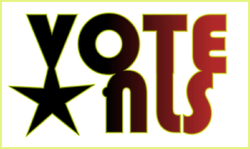
Another party poster of the New Lovian Socialists, also designed by David York.
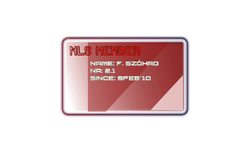
Membership card of the NLS.
An active member is someone who is on the list of MOTC candidates. Active membership numbers begin with the number 2. The amount of active members is quite low, becaus of the small population of Lovia resulting in fewer political activity than usual, but also because Ferenc Szóhad wants to keep control of the party. But last and definitely not least is the fact that the Lovian congress is quite small, because Lovia is a ministate. The NLS isn't likely to take more than one seat in the upcoming elections of 2011.
A passive member is someone who is not on the list of MOTC candidates, but still a member of the NLS. Passive membership numbers begin with a 1. There are currently about 150 passive members. However, unlike the name suggests, a passive member isn't always passive. He or she can still fulfill duties for the party, and the only difference with an active member is that he or she isn't on the candidates list for becoming MOTC in the elections.
Becoming a member
Becoming a passive member of the NLS was quite easy; the only thing you had to do is filling in this form, and post it in the online party mailbox.
When somebody wants to become an active member, he or she needs to have been passive member for more than one month in order to be able to fill in this form, and post it in the online mailbox.
Publications
The Red Morning

Logo of The Red Morning
The party published The Red Morning, which is free for all members. This satirical and critical journal has an internet edition and a paper edition.
After the official first edition copy of The Red Morning rolled of the press, the amount of subscriptions rose rapidly. With about 2,000 people buying the newspaper on a daily basis it is amongst the most read political publications of the country. Because of its obvious political orientation the newspaper has a lot of adversaries but the amount of officials supporting the newspaper is undeniably high. Prime Minister of Lovia Yuri Medvedev reads a copy with his daily morning coffee and even abroad the newspaper scores well. Fidel Castro, leader of one of the five remaining communist states Cuba, reads their foreign news online. 'Finally something to practice my English without poisoning my mind' the liberator commented. The newspaper are also working on a deal to publish in the People's Republic of China.[4]
The amount of subscriptions to the TRM reached the 2,500, hours after the first edition was released. About 76% of the subscriptions is by Lovians, of which a few hundred are member of the New Lovian Socialists. "I like their mix of opinions and news. Also, their foreign news is excellent.", thus said a reader. The internet edition, only accessible by readers, had been visited by 2,345 individual readers on the first day, and almost crashed. The paper edition is now available at some kiosks as well. "I is sellin' ev'rything thos nutta's buy", thus said a owner of a newspaper stand. Others had more profound opinions. "I like the design, and it perfectly fits the assortiment of my stand", thus said another stand owner.[5]
Socialists Bibliothéque
The NLS publishes books as well as pamphlets, in imitation of the CPL.nm, allied with the NLS in the concept Groupthink. Unlike the CPL.nm, the NLS only sporadic publishes socialist classics. The few classisc published by the NLS include Das Kapital by Karl Marx and two books by Lenin, as well as On Contradiction by Mao Zedong.
The other publications of the NLS Socialists Bibliothéque include books by party members, including a few writtenby Ferenc Szóhad on Esperanto, dystopian issues, American interference and communism in Africa, a subject not quite highlighted that much in popular literature. The NLS Socialists Bibliothéque owns the exclusive rights to all this books. The NLS Socialists Bibliothéque also includes books by Abdullah Al Felem, Damian Carter and David York.
|
|
|
References and notes
- ↑ More common used for the CPL.nm than the NLS.
- ↑ Taken from the NLS party program.
- ↑ Term coined by The Red Morning.
- ↑ Castro reads TRM. Article in The Red Morning about Fidel Castro and the amount of readers.
- ↑ Subscriptions reach 2,500. Article in The Red Morning about the amount of subscriptions.
